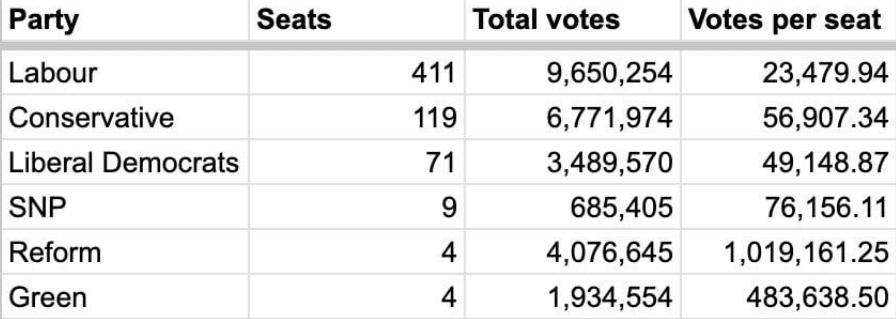Great Game – Election Analysis for UK, France and Iran

Welcome to another election-heavy Great Game as we continue the 2024 ballot bonanza. This week saw the pivotal elections in both the UK and France as well as a very different, but also very interesting presidential election in Iran. We’ll cover all three and what they might mean for investors.
United Kingdom
The 14-year reign of the Conservative Party is over as Labour secured a historically comfortable 411-seat majority in the House of Commons. This allowed sir Keir Starmer to move in at 10 Downing Street and be the second Prime Minister to serve under the new King.
Reform UK gained an incredible 4.1 million votes (14.3%), almost entirely pulled from the Conservative Party, who dipped 19.9%-points since 2019. However, Reform UK only gained 4 seats due to the British “first-past-the-post” system, which saw Reform UK come second or third in most constituences but only first in 4.

Labour almost doubled their number of seats in Parliament while only surpassing their 2019 result by 1.7%-points. In short, Labour only won the election because the right wing vote was split in two between the Conservatives and Reform UK. So while the electorate was clearly tired of the Conservative leadership after 14 years, this was not a landslide to the left or a token of broad public support for Labour policies.
Many have pointed to the undemocratic nature of the British voting system since it leaves Reform UK (as well as the Green Party) virtually unrepresented in Parliament despite gaining millions of votes. While this is true enough, it’s important to remember two points. First of all – this is how the system was designed to work back in the 1700s – to provide the country with a stable and functioning majority to rule the country (or at the time of invention, the empire) and to basically let each town or area send one person to represent them. Nowadays, politics is less about representing your constituency and more about national policies and ideology, so the system may not make sense – but it is essentially working as designed. Secondly, you could argue that the system is even more adaptable for growing public sentiments or movements. 10-15 years ago, the predecessor to Reform UK, UKIP, grew so rapidly in popularity that the Conservatives had to embrace some of their poilicies – most notably the Brexit vote. This meant that while UKIP was not represented in the 2015 elections, their ideas were adopted by one of the major parties, even to the point that UKIP was made redundant and didn’t even run in the 2019 elections because there was no longer a need for a “brexit party”. That’s also why you should expect the Conservative Party to slowly adopt many of the Reform UK policies and essentially “swallow” the party before the next elections and in that sense the ideas and protests of Reform UK will absolutely be heard by the political system.
Anyway – what does this mean for investors?
We cover the three recent elections and what they mean for investors and geopolitics


0 Comments